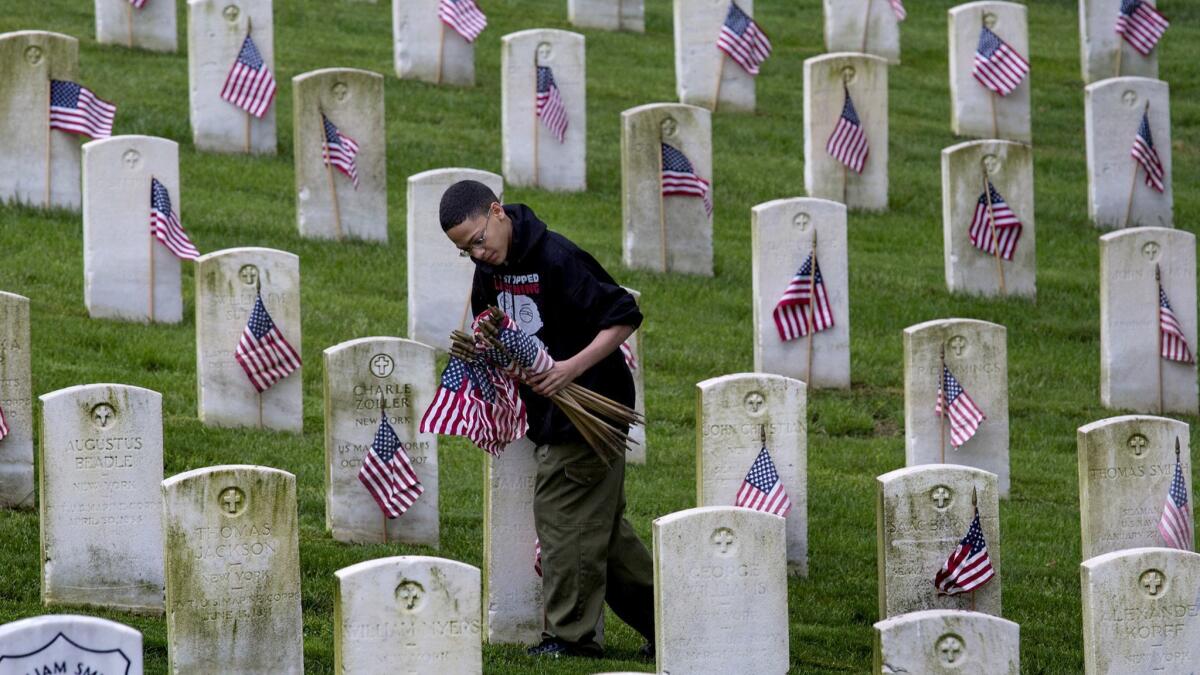Op-Ed: Wars often exacerbate the problems they were intended to solve

- Share via
“If Iran wants to fight, that will be the official end of Iran,” President Trump tweeted last week. “Never threaten the United States again!”
The presidential saber-rattling came just days before Memorial Day, clouding the holiday when we remember those who died in battle by raising the possibility we could soon see casualties from a new war.
Already, non-emergency State Department employees have been evacuated from neighboring Iraq. A carrier strike force is being deployed. A contingency plan envisions sending up to 120,000 U.S. troops to the region in case of war — a war that national security advisor John Bolton has long pushed for. And the harsh, repressive regime in Iran hasn’t helped matters by making a few bellicose gestures of its own.
The roster of wars that created more problems than they solved is long. Let’s hope that a conflict with Iran does not join that list.
Wars start easily because they promise to resolve problems. In the eyes of Trump’s White House, Iran presents plenty of issues to worry about, including the possibility it will develop nuclear weapons and its support for militias hostile to American allies including Israel and Saudi Arabia.
As we remember our war dead today, let’s also consider the wars they fought in, which all were launched to solve problems, but far too often caused new ones.
Think, for example, of our 2003 invasion of Iraq. The problem there, of course, was Saddam Hussein: a brute toward his own people and a threat to his neighbors and possibly to us (remember those alleged weapons of mass destruction?). That spring, less than two months after the war began, Hussein had been removed, and President George W. Bush stood before a “Mission Accomplished” banner to announce an end to major combat operations in Iraq, despite more work to do.
But whatever the mission was, despite more than $1 trillion spent and hundreds of thousands of deaths, it still hasn’t been accomplished. U.S. troops remain in Iraq, their ongoing presence goading a new generation of extremists, and the reputation of the United States has suffered mightily. None of this, of course, was foreseen in 2003.
Of the conflicts that everyone was certain would resolve troublesome issues, the granddaddy of them all was the First World War.
For Austria-Hungary, whose gunboats on the Danube River fired the first shots that summer of 1914, going to war seemed the best way to suppress the various nationalisms boiling under the creaky empire’s surface. Crushing Serbia would show both the Serbs and other ethnic groups in the region who was boss, once and for all. To Imperial Germany, joining the fight was intended to be, as German General Helmuth von Moltke put it, the decisive showdown in the “struggle between Germandom and Slavdom.”
Enter the Fray: First takes on the news of the minute »
Even the countries who were not aggressors joined in with remarkable eagerness because they, too, had problems they wanted to solve. Another creaky empire, Tsarist Russia, had been defeated in a war nine years earlier, losing, humiliatingly, to Japan. Both generals and ordinary Russians were eager to avenge that shame. As the nations of Europe traded ultimatums that made war seem inevitable, a vast crowd appeared in front of the Winter Palace in St. Petersburg, sank to its knees and sang the national anthem, “God Save the Tsar.”
And in France, fatefully bound by treaty to Russia, people hoped war could undo another humiliation: the loss of much of Alsace and Lorraine to Germany in the Franco-Prussian war more than 40 years earlier. French authorities had under surveillance several thousand outspoken radicals they were certain would be draft evaders. To official amazement, 80% of those men showed up to do military service.
You know how the story ended. By the war’s close in 1918, the dead included more than 9 million soldiers, and, by some reckonings, an even greater number of civilians. Twenty-one million men were wounded, many severely. The war left what Winston Churchill called “a crippled, broken world” and a Germany so filled with bitterness and resentment that it made an even more deadly war inevitable 20 years later. Can you imagine the Second World War happening without the legacy of the First?
The roster of wars that created more problems than they solved is long. Let’s hope that a conflict with Iran does not join that list.
Adam Hochschild’s books include “To End All Wars: A Story of Loyalty and Rebellion, 1914-1918.”
More to Read
A cure for the common opinion
Get thought-provoking perspectives with our weekly newsletter.
You may occasionally receive promotional content from the Los Angeles Times.









